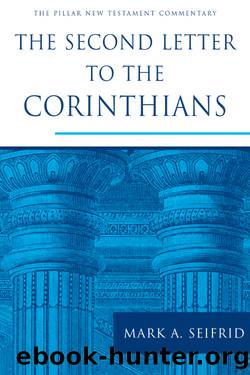The Second Letter to the Corinthians by Seifrid Mark A.;

Author:Seifrid, Mark A.; [Seifrid, Mark A.]
Language: eng
Format: epub
Tags: REL006070 Religion / Biblical Commentary / New Testament
Publisher: William B. Eerdmans Publishing Company
(3) The Appeal from the Reception of Titus (7:2-16)
The chapter begins with an appeal to the Corinthians (7:2-4). Paul continues the exhortation that he begins in 6:11-13. The rest of the chapter is to be read as an elaboration of this appeal: the troubles with the Corinthians have not been overcome, even if a temporary victory has been achieved in the Corinthian reception of Titus, Paulâs messenger.
Nevertheless, the tone of the chapter is entirely positive, as Paul seeks to build upon this victory. Paul now closes the circle of the argument of the body of the letter. He again takes up the narrative of his concern for the Corinthians that he broke off at 2:11-13. The themes and questions of that narrative now reappear, as Paul recalls the drama that called forth this letter. He earlier left off the story with his departure for Macedonia (2:13), and he takes it up again with his arrival and meeting there with Titus, whom he had sought in Troas in his concern for the Corinthians (7:5). Paul, who had been thrust into distress over the Corinthians, has been comforted by God through them. He therefore rejoices (7:5-7). The themes of joy and sorrow in relationship to the Corinthians that Paul introduces in 1:23â2:4 come to expression again here, signaling the closure of the argument (7:8-13a). Paul underscores Titusâs joy over the response of the Corinthians to his mission to them (7:13b-16). The fidelity of the Corinthians to the apostle is no private matter, and it does not have to do with Paulâs person. It has to do with their fidelity to the Gospel, which binds them to Christ, and thereby to Titus and to all other Christians. Paulâs concluding words prepare for his appeal to the Corinthians to complete their promised contribution for Jerusalem, which will serve as an expression of their acceptance of the apostolic Gospel (8:1â9:15).
The closure of the body of the letter makes clear again that this letter to the Corinthians was entirely occasional, called forth by the confrontation that took place in Corinth, Paulâs decision not to visit the Corinthians, and the âtearful letterâ that caused them so much grief. The occasion calls forth from Paul a profound and remarkable defense of the apostolic mission, the meaning of which transcends these particular circumstances without ever leaving them behind. Basic questions about Christian life, the interpretation of Scripture, and the significance of the apostolic message are answered in Paulâs response to the Corinthian defection.
As we have noted, Paul by no means regards the Corinthiansâ positive response to Titus as the end of the story. Their relationship with one another remains fragile. This is already clear from his personal appeal prior to his happy report. The drama of the letter centers upon the threatened relationship of love that exists between the apostle and his church. More precisely stated, it is the relationship of love between Christ and the church, to whom the apostle has betrothed them (11:2). Yet the church does not have independent access to Christ but may come to him only through the apostolic word.
Download
This site does not store any files on its server. We only index and link to content provided by other sites. Please contact the content providers to delete copyright contents if any and email us, we'll remove relevant links or contents immediately.
The Five People You Meet in Heaven by Mitch Albom(3550)
The Secret Power of Speaking God's Word by Joyce Meyer(3161)
Real Sex by Lauren F. Winner(3005)
Name Book, The: Over 10,000 Names--Their Meanings, Origins, and Spiritual Significance by Astoria Dorothy(2969)
The Holy Spirit by Billy Graham(2938)
0041152001443424520 .pdf by Unknown(2842)
How The Mind Works by Steven Pinker(2811)
ESV Study Bible by Crossway(2772)
Ancient Worlds by Michael Scott(2677)
Churchill by Paul Johnson(2576)
The Meaning of the Library by unknow(2563)
The ESV Study Bible by Crossway Bibles(2546)
The Gnostic Gospels by Pagels Elaine(2517)
MOSES THE EGYPTIAN by Jan Assmann(2411)
Jesus by Paul Johnson(2349)
City of Stairs by Robert Jackson Bennett(2337)
The Complete Dead Sea Scrolls in English (7th Edition) (Penguin Classics) by Geza Vermes(2269)
The Nativity by Geza Vermes(2224)
Ancient Near Eastern Thought and the Old Testament by John H. Walton(2220)
